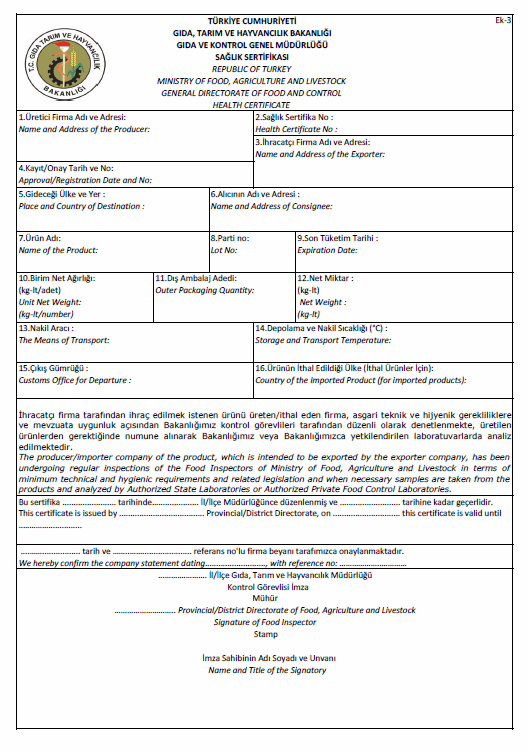All food products that will be subject to international trade, whether of animal or non-animal origin, must be fit for human consumption and comply with all relevant food legislation such as hygiene, pesticides, genetic, labeling, contaminants, use of additives etc.
A health certificate is a document used in export import transactions, issued by the governmental organizations at the countries of origin, to certify that a food shipment is fit for human consumption, and meets safety standards or other required legislation for exporting.
As indicated by its name, this certificate gives evidence of the health condition of the goods and is usually issued by a veterinary surgeon, by veterinary authorities or the agricultural ministry. (1)
What is the Function of a Health Certificate in Export / Import Transactions?
- Certifying that governmental body of the exporting country has been examined this particular food consignment.
- Certifying that food of animal origin or non-animal origin subject to exporting is fit for human consumption.
- Certifying that the food consignment has been produced according to required food legislation.
- Certifying that the food consignment has been produced by one of the legitimate manufacturing companies.
Which Organizations Issue Health Certificates?
Health certificates are government to government declarations (exporting country’s government to importing country’s government), for this reason these certificates are issued by the authorized governmental organizations such as Department of Agriculture etc…
Examples of Health Certificate Requirements:
- Saudi Arabia: The health certificate is required for all exports to Saudi Arabia of all kinds of meat (including poultry and seafood), meat products, livestock, vegetables, fruits, human blood, etc., attesting that they are free from pests and/or diseases.
(Source: link) - European Union: Each consignment of meat and meat products, fishery products etc. that import into EU from a Non-EU member state must come from an approved non-EU country and be accompanied by appropriate signed health certification.
How to Use Health Certificate in Letters of Credit Transactions:
- Health certificates do not cover under specific articles in the letter of credit rules. As a result, issuing banks must define the characteristics of the health certificates when they issue the letters of credit.
- If no special requirement has been attached to the letter of credit, which demands presentation of a health certificate, this will be satisfied by the presentation of a signed document titled as called for in the credit.
- Health certificate must fulfill its function by certifying that the goods are fit for human consumption with the help of required action, such as, the results of the analysis, inspection, health, phytosanitary, quantity or quality assessment.
- Health certificate must be issued by the party stated in the letter of credit.
- If the letter of credit does not indicate by whom the health certificate must be issued, any party including the beneficiary may issue the health certificate.
Health Certificate Samples:
- Sanitary Certificate Example
- Public Health & Sanitary Certificate
- Certificate of Sanitation and Free Sale
- Certificate of Sanitation
- Certificate of Free Sale
References:
- Documentary Credits, Nordea Trade Finance, Page:175

